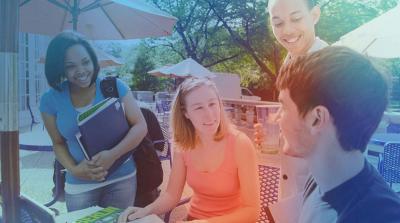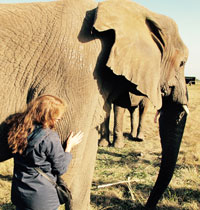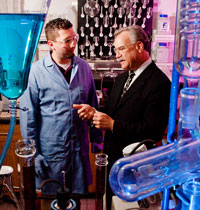Newly Admitted James Scholars
Congratulations on being admitted to Illinois as a James Scholar! Our campus has a long tradition of recognizing students with great academic aptitude and you should be very proud of this honor.
By participating in the AHS James Scholar Honors Program, you will have many opportunities to expand your experience outside the classroom to further your academic, research, community engagement, and leadership skills.
Prior to attending New Student Registration, you will receive information via email with details about the program and the requirements. Since the program is voluntary, we will also ask you to complete a form indicating your interest in participating. Keep an eye out for that email shortly before you register.
Please email Dr. Tonya Pulley with any questions about the AHS James Scholar Honors Program.
If you were admitted as an AHS James Scholar and would like to participate in the program, please complete this short form: Participation in James Scholar Honors Program.
DEADLINES for Spring 2024
Submit Self-Nomination Forms: Jan. 26 at 11:59 p.m.
Submit Honors Plans: Feb. 9 at 11:59 p.m.
Submit i-Program completion certificates: May 10 at 11:59 p.m.
Submit i-Program and any other required essays: May 10 at 11:59 p.m.
Volunteer supervisors complete volunteering documentation: May 10 at 11:59 p.m.
Requirements for the James Scholar Honors Program
To remain a James Scholar, a student must:
-
- Maintain a 3.50 yearly Illinois GPA (evaluated at the end of the spring semester).
- Submit an Honors Plan (or two) by the 4th Friday of the semester.
- Successfully complete the honors project(s).
- Complete at least 12 graded hours on the UIUC campus each fall and spring semester.
- Not be found guilty of an academic integrity violation.
Honors projects
In general, honors projects are opportunities for students to expand their academic experience either in or out of the classroom. Please visit the Requirements page for an overview of the options for completing an honors project.
For students beginning their first semester on our campus, a few honors project options would be most appropriate. Click below to find out specifics.
AHS James Scholars in the 2024 Undergraduate Research Symposium
- Afnaan Afsar Ali: Understanding the Preferences of Older Adults in Using Virtual Reality to Support Social Engagement
- Ava Amabile: Investigating Topic Maintenance and Organization to Advance Understanding of Kindergarten and First Grade Opinion Writing
- Sinan Anwar: Assessment Preferences and Accommodations: A Comparative Study in the Classroom
- Saiesha Bollapragada: Public Health Preparedness Among UIUC Students During Extreme Heat Conditions
- Olivia Burns: Systematic Review on the Effects of Translation Technologies on Health Literacy in Adults
- Emily Butryn: Systematic Review on the Effects of Translation Technologies on Health Literacy in Adults
- Sophie Campa: Increasing the Speech Intelligibility of Individuals with Down Syndrome in AI Voice Assistants
- Aubrey Cervantes: Mind Matters in Motion: Unraveling Affective Responses in High-Intensity Interval Training
- Angela Chahine: Climate Change and Chronic Conditions: Crafting New Exercise Paradigms
- Abrahám Chávez: Testing Speech Intelligibility Using Firefighter’s Two-Way Radios
- Natalya Cheema: The Influence of Dysphagia on Eating Behaviors in Individuals with Multiple Sclerosis: A Literary Review
- Elenna Claudio-Deutsch: Emotional Perceptions: Comparing and Contrasting Misophonia and Hyperacusis
- Maya Dye: Challenges and Solutions in Engaging in Entertainment Events for Late-Deafened Older Adults: An Archival Analysis
- Joel Emil: Transition of Student Service Members and Veterans to Higher Education: A Scoping Review
- Tess Giddens-White: Speech Intelligibility with Airpods Pro
- Shaun Gillespie: Testing Speech Intelligibility Using Firefighter’s Two-Way Radios
- Liz Gremer: Increasing the Speech Intelligibility of Individuals with Down Syndrome in AI Voice Assistants
- Kate Gronlund: Latina and Latino Experts’ Perceptions of Activity-Friendly Routes to Everyday Destinations
- Claire Grossen: Online Adult Entertainment Platforms: Understanding Motivations and Differences between the Users and Non-Users
- Samaria Harris: Rooted in Empowerment: A Qualitative Exploration of Implementing a Culturally-tailored Community Gardening Program for African American Women Using the Black History Knowledge Model
- Kate Harty: Vocal Effort in Dining Halls to Optimize Speech Intelligibility
- Katie Hopkins: A Report on Health Care Access for African American Chronic Kidney Disease Patients and How Community Health Workers Can Improve It
- Abigail Keasler: Increasing the Speech Intelligibility of Individuals with Down Syndrome in AI Voice Assistants
- Emily Kinel: Investigating Topic Maintenance and Organization to Advance Understanding of Kindergarten and First Grade Opinion Writing
- Isabella Lau: Developing a New Test to Investigate the Impact of Classroom Noise on Children’s Listening Comprehension
- Kendell MacDonald: Exploring the Influence of Socialization on the Social and Emotional Development of Preservice Physical Education Teachers
- Elizabeth Martinez: Mind Matters in Motion: Unraveling Affective Responses in High-Intensity Interval Training
- Emma Mueller: Increasing the Speech Intelligibility of Individuals with Down Syndrome in AI Voice Assistants
- Katie Naveja: The Influence of Sex on Periarticular Scapular Morphology
- Noah Olivero: Unified Measurement of Virtual Reality Immersion for Older Adults
- Brianna Osmon: Entrainment to Naturally and Rhythmically Spoken Speech: Effect of Age and Hearing Loss
- Holly Panfil: Cued Task Switching in Young Adults
- Anjali Patel: Developing Mindfulness-based Intervention Based on Experiences of Postpartum Depression and Pain
- Aditi Patel: What's Up Danger: Testing the Response of Birds to a Variety of Alarm Calls
- Corrie Penrod: Increasing the Speech Intelligibility of Individuals with Down Syndrome in AI Voice Assistants
- Lizbeth Ramos: Familial COVID-19 Stress and Infant Temperament Through the Lens of Socioeconomic Status
- Savanna Rudy: Examining Sex Differences in the Balance of Glenohumeral Musculature
- Maddie Russel: Developing a New Test to Investigate the Impact of Classroom Noise on Children’s Listening Comprehension
- Natalia Rzepa: Cued Task Switching in Young Adults
- Sabeen Sadruddin: Engaging Asian American Family Caregivers in Clinical Trials: Findings from a Nationwide Study
- Arya Shah: Analysis of Postural Control Dynamics Through Foot and Shoe Size Analysis
- Brianna Sirdich: Associations between Environmental Health Literacy and Indoor PM Exposures Among Families Living in Champaign-Urbana
- Lauren Stec: How Voice Quality, Cognition, and Background Noise Impact Children's Speech Understanding
- Megan Thing: Effects of Age, Hearing Loss, and Test Modality on Memory for Backward Digits
- Jae’da Thompson: The Impact of Structural Racism on Black Residents in Champaign County
- Asritha Tunuguntla: Comparing Singers’ Perceptions of Real and VR Performance Venues
- Anika Urbonas: Supporting Engagement and Activity Through Virtual Reality
- Valerie Weinshenker: Assessment Preferences and Accommodations: A Comparative Study in the Classroom
- Alexa Worthley: Usability Testing of a Digital Medication Self-Management Tool for Persons with Mild Cognitive Impairment
- Dorota Wulw: Investigating Topic Maintenance and Organization to Advance Understanding of Kindergarten and First Grade Opinion Writing
- Max Zagorski: Differences in the Multidimensional Sexual Self-Concept between Transgender and Cisgender Individuals






